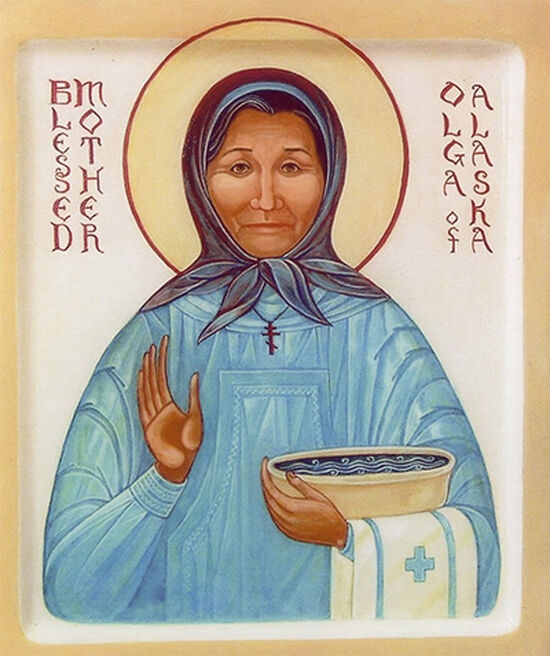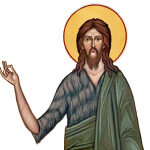The Orthodox world is rejoicing today, for the Holy Synod of Bishops of the Orthodox
Church in America has canonized the righteous Matushka Olga of Alaska, proclaiming
her coming glorification and making her the soon-to-be the first woman glorified by the
Church for having shown forth in sanctity in North America. A video can be found here:
https://www.oca.org/media/video/proclamation-holy-synod-bishops-glorification-righteous-matushka-olga
Her humility, her generosity, her piety, her patience, and her selfless love for God
and neighbor were well-known in the Kuskokwim villages during her earthly life. Her
care for comforting the suffering and the grieving has also been revealed after her life by
grace-filled manifestations to the faithful throughout not only Alaska, but all of North
America. As such, she has been long-venerated in Alaska since her repose in 1979, and
has come to be a known as a great intercessor for midwives, those struggling in
childbirth, and those who have been sexually abused. The liturgical services of
glorification will take place after the uncovering of her holy relics, the preparation of the
official account of her life, and consultations have been made with the Yup’ik elders
about the most propitious time for the eventual celebration, the most favorable location
for her final resting place, and the most appropriate content for the hymnography in her
praise. Her main feast will be celebrated yearly on November 10 – the third day of her
repose, transferred due to November 8 being the Feast of the Angels – and she will also
be numbered among the Saints of North America in the second Sunday after Pentecost.
The faithful are asked to continue to pray for her repose among the departed as we draw
near to her official glorification. Righteousness Mother Olga, pray to God for us!
Brief Life of St. Olga of Alaska
“God can create great beauty from utter desolation.” – St. Olga of Alaska
On February 3, 1916, a girl named Arrsamquq was born into an indigenous Alaskan
family of Yupik origin. The presence of the Russian mission in her community helped
spread the faith among the local people, and she was among the first to be baptized as
an infant. At baptism, she was given the name Olga. From a very young age, she lived
with the love of God. She was hard-working and prayed a lot for her family and her
fellow villagers. By her teenage years, she already knew multiple liturgical texts and
hymns in the Church Slavonic and Yupik languages.
She married a man from her village. It was an arranged marriage. Her husband was
adept at fishing and hunting. He established a general store and opened the first post
office in his village. However, he was not a particularly churchly man. During the first
years of their marriage, they had a troubled relationship filled with strife and arguments.
But Olga did not despair. Instead, she prayed fervently for her husband and her non-
believing neighbours. Through her prayers, after a time her husband — baptized with
the name Nicolai — began to attend church. He brought six other men from the village
with him. They all became readers. Nicolai Michael went on to study at so called “Aleut
School”, similar to those that were founded by Saint Innocent with the support of the
Russian Missionary Society, in Sitka. He studied under the direction of Bishop Amvrossy
(Merejko) [later Archbishop of Pittsburgh, 1967-1974]. After graduation, he was
ordained into the priesthood. From 1963, he was a priest in his village of Kwetluk, and
became greatly beloved by his people. Incidentally, throughout the lifetime of Saint
Olga, the great majority of the students who went this school came from her tiny village.
The couple’s married life changed significantly after Nicolai’s ordination. As a priest,
Fr. Nicolai Michael travelled extensively to twelve surrounding villages to conduct
services and occasional offices. Travel between the villages was done on rivers, by boat
in the summer, or by snow machines or dog-driven sleds in the winter. Matushka Olga,
who was the only able midwife around, accompanied her husband to assist the women
in childbirth and ailments. Olga gave birth to thirteen of her children without a midwife.
Five of them did not survive to adulthood because of illness and a harsh climate.
Matushka Olga Michael worked hard keeping house, raising children, making
vestments, and baking prosphora. Despite her busy schedule, she would also go to the
homes of others to cook and clean for them. With word and deed, Olga showed people
the example of Christian life according to Lord’s commandments. Not only did she help
others with their housekeeping, but she also made boots, parkas, socks, and mittens to
distribute among the parishioners. For her acts of charity, she was nicknamed the New
Tabitha. She was particularly mindful of the troubled women who suffered from
domestic violence. She would often ask women in her village to take a steam bath with
her, where they could not hide the physical and spiritual scars of the abuse done to them.
She counselled the women and said words of reassurance to each. Her compassion and
sensitivity struck many as if she had lived through the same situation in her life.
As she was growing older, her daughters were assuming more of her workload. The
hard-working Matushka Olga had more time to travel with her husband, help the people
from the surrounding villages, and teach midwifery skills to younger women.
Eventually, however, Matushka Olga began to feel weak and ill and lose weight. Her
concerned family persuaded her to go to hospital. The specialists there diagnosed
terminal cancer which they said was beyond treatment. Her children received the news
with much grief and prayed fervently at the local holy places. As for Matushka Olga,
she was not resigned to her bed rest. While her daughters were away, she continued to
go outside, hauling buckets of water from the village well.
In the last days of her life, she prayed a lot and left her last instructions to her family
in preparation for her peaceful repose. On November 8, 1979, she partook of the Holy
Sacraments, crossed herself, and departed peacefully to God. She was buried in her
wedding gown, which she had kept throughout her life.
Her death coincided with the feast day of Archangel Michael whom she revered. The
people from her village remembered her standing under the icon of Archangel Michael
at church.
She also continued to intercede for needy women. A woman from her village saw
Matushka Olga in her dream. St. Olga told the woman that her mother had a terminal
illness, and reassured her that her mother was departing to heaven. The woman saw her
mother before her death and helped her prepare for her peaceful repose.
A woman who suffered from the trauma of sexual abuse reported another miracle
with Matushka Olga. One day as she was praying, she began to have an intense
flashback of her sexual abuse as a child. She pleaded with the Mother of God to help her.
Little by little, she went into a trance and saw herself walking in a forest. A gentle wave
of tenderness began to sweep through the woods followed by a fresh garden scent. She
saw the Virgin Mary, dressed as she was in an icon, but more natural-looking and
brighter, walking toward her. As she came closer she was aware of someone walking
behind her. She was one of the indigenous people of the North. The Mother of God said
that it was Saint Olga. Saint Olga gestured for the woman to follow her to a little hill that
had a door cut into the side. Mother Olga helped her up on a bed and rubbed something
on her belly, which looked five months pregnant (although she was not pregnant in
reality). Mother Olga pretended to labour with her. She pushed out something like an
afterbirth, and she was filled with wellness and a sense of quiet entered her soul. As the
woman recalled, Saint Olga’s eyes spoke with great tenderness and understanding. It
was the kind of loving gaze from a mother to an infant that connects and welcomes a
baby to life. Only after this did Holy Mother Olga speak. “The people who hurt you
thought they could make me carry their evil inside of you by rape. That’s a lie. The only
thing they could put inside you was the seed of life which is a creation of God and cannot
pollute anyone.” At the end of this healing time, they went outside together. The sky
was all shimmer with a moving veil of light. At that moment, the woman heard in her
heart that this moving curtain of light was a promise that God can create great beauty
from complete and utter desolation and nothingness.
The first miracle attributed to her was reported on the day of the saint’s interment.
In Alaska, the month of November is the height of the winter season. By the time of her
death, the rivers had already frozen over to preclude travel by boat, but the ice was still
not strong enough to support a snow machine. Many people lamented not being able to
bid their last farewells to their beloved Matushka. The Lord heard their prayers. On the
day of her funeral, there was a thaw. The ice on the river melted, enabling many people
to come to Kwetluk by boat to attend her funeral. As her body was being carried to the
grave, summer birds were hovering over the procession. Even the soil in the graveyard
had softened. On the next day, the cold weather returned and ice covered the river.
Winter was back.
With this wondrous moving curtain of light, Saint Olga O Michael, a humble
Matushka from Alaska has illuminated the lives of the people around her. In the first
lines of her Akathist, we read: “The God who makes the moving curtain of the northern
lights made thee as a living light, shining in the far north and lighting up the desolate
with His great beauty. Beholding this radiance, we, thy children, lift up our voices and
sing.” Although this locally revered saint still awaits her official canonization, we still
invoke her prayers for the healing and reassurance of every pious woman, midwife and
everyone in need.


